Vittas International is a Fintech company founded in 2019 with the goal to bring transparency to the lending ecosystem in Nigeria by providing lenders with a tool to better assess the credit risk of potential borrowers. To effectively accomplish this goal, Vittas wanted to learn from global competitor(s) and other adjacent financial services companies that have succeeded and failed in similar technology-driven endeavors. The project scope included conducting a competitive analysis of Fintech products and business models and providing Vittas with insights and recommendations. To overcome challenges related to raising capital for debt financing, Vittas wants to set-up a digital bank. The project scope included identifying the process of setting-up a digital bank and developing an implementation plan for Vittas.
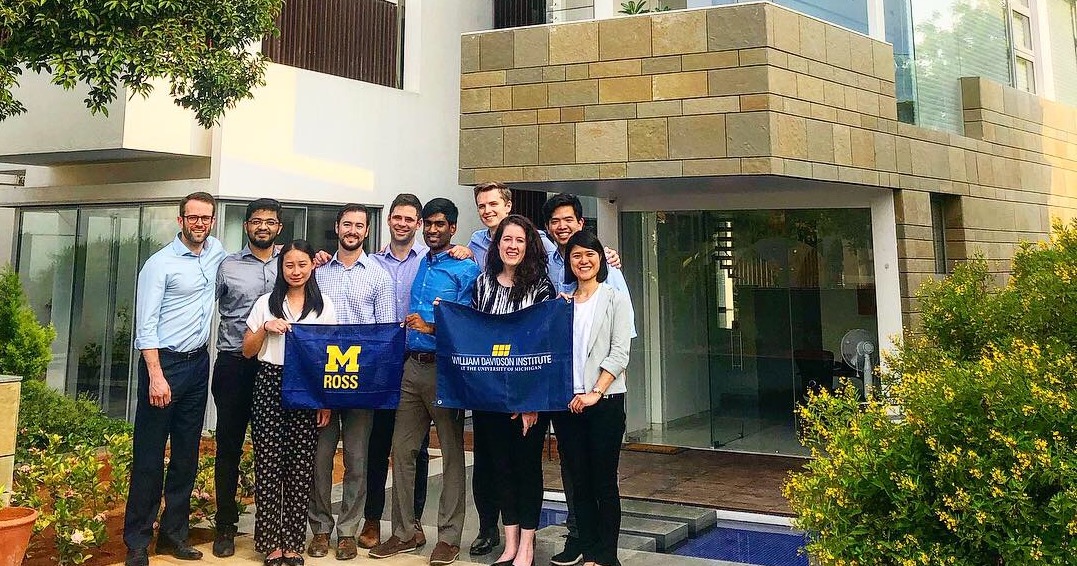
Members of the International Investment Fund and MADE MAP teams working in India this past March.
WDI is partnering with the Ross School of Business and Finance Professor Gautam Kaul to establish a curriculum-based, student-run international investment fund at the University of Michigan, believed to be the first of its kind at a U.S. university.
The fund, called the International Investment Fund (IIF), will target small- and medium-sized enterprises (SMEs) in India. Graduate students enrolled at Ross and in joint-degree programs with other U-M schools and colleges will be responsible for investing, managing and growing the investment portfolio as part of a course at Ross. WDI has worked closely with Kaul to develop the fund and made an initial financial commitment to the fund.
 And while the course at Ross won’t begin until winter semester in 2020, work has been ongoing for multiple years. This past winter a Ross student MBA team sponsored by WDI traveled to India to conduct an initial round of due diligence on local SMEs to assess the viability of the process and the potential for investments. Students and Ross faculty are also working to establish a protocol for the fund and received assistance from the University of Michigan Law School on the legal requirements on both the U.S. and Indian sides.
And while the course at Ross won’t begin until winter semester in 2020, work has been ongoing for multiple years. This past winter a Ross student MBA team sponsored by WDI traveled to India to conduct an initial round of due diligence on local SMEs to assess the viability of the process and the potential for investments. Students and Ross faculty are also working to establish a protocol for the fund and received assistance from the University of Michigan Law School on the legal requirements on both the U.S. and Indian sides.
Forty students applied to be part of the fund and the class and 13 were selected. They will travel to India in August to conduct more work and due diligence on SMEs. Another 13 students will be added during the next academic year, Kaul said, and the eventual target for the fund is 35-40 student advisors all chosen after a rigorous application and interview process.
Kaul, who started Ross’ successful Social Venture Fund, said he has thought about an international fund for years and has received encouragement from students to start one. He said he started work with some second- and third-year MBA, Erb Institute and public policy graduate students on the idea about four years ago. He said it became obvious he couldn’t replicate the Social Venture Fund, which invests only in the U.S.
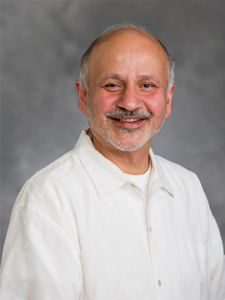
Professor Gautam Kaul
“It’s quite an adventure to go to another country and initiate something so complex,” said Kaul, the Robert G. Rodkey Collegiate Professor of Business Administration & Professor of Finance. “Just to get to know the system takes a while.”
He also said the university and Ross didn’t want to start this alone, but potential international partners on the ground “wanted proof of concept.”
Kaul approached WDI President Paul Clyde to see if the institute was interested in partnering because of its global focus and work with budding entrepreneurs. Clyde said the idea of an international investment fund “fit with our Finance sector goals, which is to figure out ways to make funding available at a lower cost to small- and medium-sized enterprises.”
Additionally, in 2017 WDI, the Zell Lurie Institute for Entrepreneurial Studies at Ross and the Aparajitha Foundations in India established the Michigan Academy for the Development of Entrepreneurs (MADE), a nonprofit institute. MADE works with entrepreneurship development organizations (EDOs) in the Tamil Nadu state of India to give individuals operating businesses in these environments the knowledge and best practices they need to thrive.
Kaul said it is a “huge advantage” that WDI has a partner on the ground in India already working with entrepreneurs.
Twenty-seven SMEs recently completed a business development program managed by MADE and its EDO, Poornatha. The entrepreneurs took monthly classes at MADE designed to help them develop financial projections, future financial plans and other necessities for potential funders, including complete financial statements.
Clyde said each of the 27 SMEs are entrepreneurs with a vision where they want to go, who have identified areas they saw as opportunities for growth and are in need of capital investment.
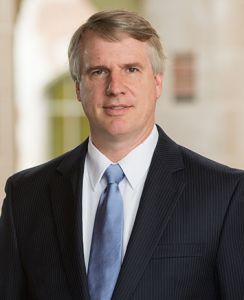
WDI President Paul Clyde
“And we know something about their character,” he said. “Through MADE, our partner has spent a lot of time getting to know them. They weren’t a random group of people. Further, we had always planned to add financing to the array of products and services offered by MADE.
“So when Gautam called with this opportunity to marry what we were already doing with MADE with this investment fund, it seemed like a perfect fit.”
Kaul said he hopes the fund will make its first investment by the end of 2020. He said if the fund was making an investment in the U.S. it would take two months to do a deep due diligence after identifying a potential start up following some pre-screening.
“In the context of this Indian initiative, it’s never been done so it could take nine months,” he said. “The purpose here is to make an investment and hope it starts paying off. But all profits go back into the fund so we can invest in someone else.”
Kaul said the course and the investment fund is “very applied, on-the-ground, experiential” and what he thinks is the future of university education.
“It is very complex, which makes me very excited,” he said. “It has got the beginnings of what I think is the future of global education. It will differentiate Ross. You’re not coming here sitting in a classroom – well, maybe for the first six months – but after that you’re all over the world.
“You’re not learning just from faculty but from the environment and everything else. That’s what the demand is for.”
Kaul said WDI has been a great partner and instrumental in making the fund a reality. While WDI is located on campus and strongly affiliated with the university, its independence gives it flexibility and maneuverability for projects such as the investment fund.
“Without WDI, I would have given up,” he said.
Clyde said in addition to the initial investment, WDI will support the travel needs of the students running the fund. Kaul is the faculty advisor for the fund and Clyde said he will help where needed and continue to be closely involved.
Kaul said the fund appeals to students who want an international, hands-on experience, but may also want to work in global settings.
“If you want to go to India and eat Indian food, this is not for you,” he said. “This is serious stuff. You have to worry about global issues, you have to worry about India, and you must take ownership of your learning. If you go there, you should be keen on learning from and helping people on the ground.”
In 2019, Ross School of Business kicked off the International Investment Fund, a WDI supported initiative. As part of that effort, WDI worked with students and faculty from Ross to establish the protocol, review the legal requirements from both U.S. and Indian perspectives, and completed an initial round of due diligence. In 2020, the fund continued by conducting due diligence, providing support to firms interested in becoming investment ready and investigating future opportunities for investments. Some of the SMEs are located in the state of Tamil Nadu, India and are affiliated with Poornatha (a MADE partner). The fund is now looking at ways to expand to other countries.
Due diligence was conducted on five SMEs for investment readiness for the Infra Group, a to-be-launched private equity fund that aspires to invest in Ethiopian SMEs using hard currency. A due diligence checklist was also developed that can be used by anyone conducting due diligence on SMEs.
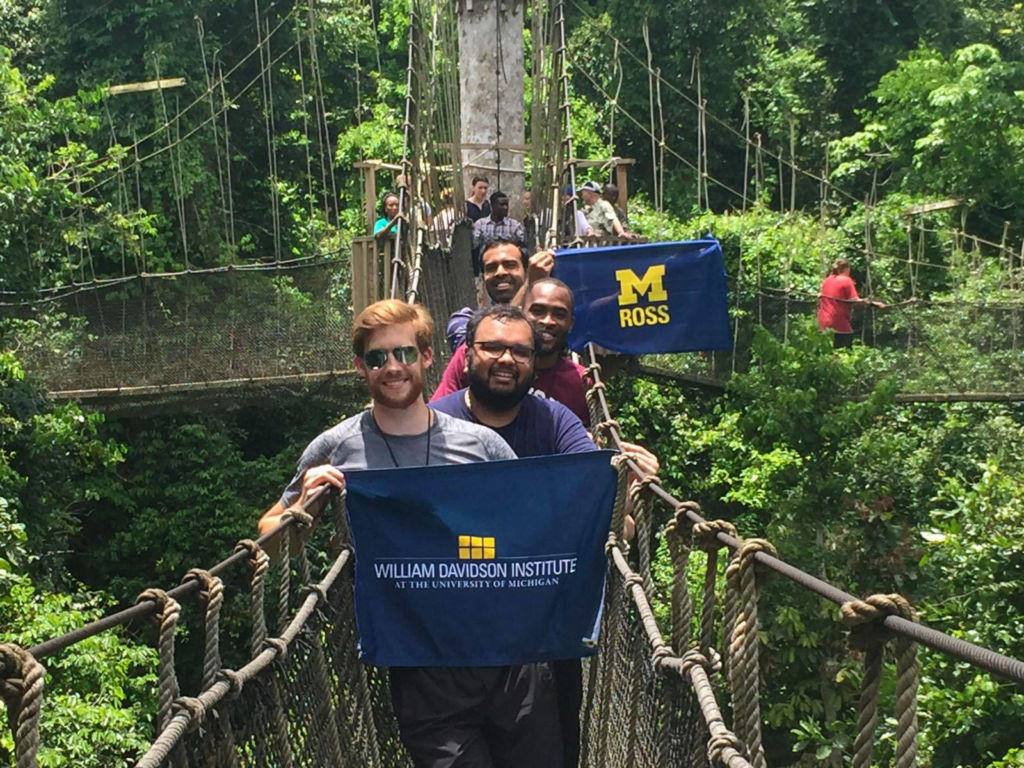
A 2018 WDI MAP team in Ghana.
Carrie Boyle, a MBA student at Michigan’s Ross School of Business, hopes to work in philanthropy somewhere in the U.S. after graduation. But for a couple of weeks in March, she is excited to be traveling to India as part of the school’s annual Multidisciplinary Action Projects (MAP).
“Working in another country is something I may never get the chance to do again,” she said. “This will be my first time in India and the country really interests me.”
Boyle and her teammates will work with Michigan Academy for the Development of Entrepreneurs (MADE), a nonprofit institute established at Ross by the Zell Lurie Institute for Entrepreneurial Studies, in partnership with WDI and Aparajitha Foundations. MADE works with entrepreneurship development organizations in India to help entrepreneurs operating small- and medium-sized enterprises (SMEs) succeed.
Boyle said she had some criteria when looking for MAPs that interested her.
“I wanted an opportunity to be on the ground having meaningful conversations with the people most immediately impacted by SMEs,” she said. “SMEs employ so many people and impact so many lives.”
Her teammate Shoko Wadano said she too is interested in working with SMEs, “which are very common in India.”
“I’m interested in how businesses mature in India,” she said. “I want to learn what pressures and impacts SMEs have in common, and what kind of value we can bring to them.”
WDI is sponsoring the MADE MAP project along with 10 others this year. MAP is an action-based learning course in which MBA students receive guidance from faculty advisors from WDI and Ross. Each project requires analytical rigor, critical thinking and teamwork. (Find out more about WDI’s MAP projects over the years here.)
After learning about their projects and conducting secondary research for several weeks, the student teams spend two to four weeks working with their organizations in the field.

David Butz
“The complementarities between the talents our students bring and what our sponsors need are sublime,” said David Butz, a WDI senior research fellow in the Healthcare sector who is an advisor on two projects. “Our students experience impact in brand new ways. Our sponsors learn, too, how disciplined management methods can yield dramatic innovations.”
Butz said he enjoys working with the student teams on MAP because it “poses such a unique challenge for both the students and their sponsor organizations, and forces us all to think big.”
“For me, the best achievements are tangible, direct and narrow but at the same time big and high-impact,” he said. “In our short time, can we help to break some key bottleneck, expedite a critical process pathway or otherwise liberate resources and expand capacity? Is the innovation scalable or replicable elsewhere? Do the students and organizations thereby feel empowered?”
Here is a summary of each WDI-sponsored MAP project:
Aravind Eye Care System – India
MAP Team: Rohan Dash, Sid Mahajan, Aman Rangan, Nik Royce
Aravind Eye Care System (AECS) is a vast network of hospitals, clinics, community outreach efforts, factories, and research and training institutes in south India that has treated more than 32 million patients and has performed 4 million surgeries since its 1976 founding.
AECS opened a tertiary eye care center in Chennai in September 2017 that will ultimately serve more patients than any other facility in the AECS system. The MAP team will formulate a detailed three-year strategic plan for Aravind Eye Hospital in Chennai.
CURE International, Inc. – Kenya, Ethiopia, Zambia, Uganda
MAP Team: Dominique James, Sarah Raney, Hannah Viertel, Olga Vilner Gor
CURE operates clubfoot clinics in 17 countries around the world, each tasked with helping children and families deal with the congenital deformity that twists the foot, making it difficult or impossible to walk.
For CURE, the student team will develop a strategic evaluation framework to assess opportunities for market entry and expansion building on global data.
Ghana Emergency Medicine Collaborative – Ghana
MAP Team: Benjamin Desmond, Benjamin Quam, Nicholas Springmann, Vishnu Suresh
The Ghana Emergency Medicine Collaborative aims to improve emergency medical care in Ghana through innovative and sustainable training programs for physician, nursing and medical students. The goal of the training programs is to increase the number of qualified emergency health care workers retained over time in areas where they are most needed.
The MBA team will formulate a detailed strategy to implement interoperable digital payment systems in Ghanian hospital emergency departments.
India Investment Fund – India
The India Investment Fund is working to become the first international, student-run fund at the Ross School of Business. Ross MBA students would be responsible for investing, managing and growing a real investment portfolio.
MAP Team: Charlie Manzoni, Patrick Riley, Queenie Shan, Sheetal Singh
The student team will conduct due diligence on Indian small- and medium-sized enterprises to assess viability for investments, and an appropriate financing instrument.
Infra Group – Ethiopia
MAP Team: Rin Chou, Chandler Greene, Yuki Ito, Brittany Minor
Infra Group is diversified international group with business units in financial services, industries and infrastructure development. Infra Group helps build a more prosperous society through global-scale business development with integrity as its top priority.
The MAP team will conduct due diligence on a group of small- and medium-sized enterprises (SMEs), and recommend which ones to invest in and what amount to invest.
Lviv Business School & Ukranian Catholic University – Ukraine
MAP Team: Blake Cao, Emily Fletcher, Kelsey Pace, Adam Sitts
Lviv Business School and Ukranian Catholic University is a private educational and research institution in western Ukraine.
The student team will undertake a needs assessment of the small- and medium-sized enterprises (SMEs) to determine if Lviv Business School should begin offering consulting services to these SMEs and if so, how those should be structured.
MADE – Poornatha/Aparajitha Foundations – India
MAP Team: Carrie Boyle, Lawrence Chen, Dillon Cory, Shoko Wadano
Michigan Academy for the Development of Entrepreneurs (MADE) is a nonprofit institute established at the Ross School of Business by the Zell Lurie Institute for Entrepreneurial Studies, in partnership with WDI and Aparajitha Foundations. MADE works with entrepreneurship development organizations in developing countries to give individuals operating businesses in these environments the knowledge and best practices they need to thrive.
The MAP team will develop an expansion plan for MADE in the southern Indian state of Tamil Nadu.
The Ihangane Project – Rwanda
MAP Team: Lauren Baum, Nadia Kapper, Paul Mancheski, Jason Yu
The Ihangane Project (TIP) empowers local communities to develop sustainable, effective, and patient-centered health care delivery systems that holistically respond to the needs of vulnerable populations. Partnering with Ruli District Hospital and its associated health centers, TIP is working to identify key strategies for improving health outcomes.
The student team will develop a business model to grow the ready-to-use therapeutic food that is used to treat severe, acute malnutrition.
WEEKEND MBA MAP PROJECTS
Awash Bank – Ethiopia
MAP Team: Matthew Campbell, Joshua Dodson, Joseph McCarty, Aman Suri
Awash Bank, a private, commercial bank, was established in 1995 and features more than 375 branches across the country.
The MAP team will develop a product that can provide capital to small- and medium-sized enterprises (SMEs) in Ethiopia by utilizing remittances already being sent back to that country. The students will work with the bank on all aspects of the loan product. They also will give the bank recommendations on how to monitor the loan and provide business support to SMEs that borrow from the fund.
Grace Care Center – Sri Lanka
MAP Team: Daniel Cady, Yizhou Jiang, Gerardo Martinez, Daniel Murray
The Grace Care Center (GCC) is a home to about 70 orphaned children that offers daycare services and vocational training. It also is home to several poor and displaced seniors, many of whom have chronic health issues such as hypertension and diabetes.
Past MAP student teams from the Ross School of Business developed a diabetic care center model for GCC. This year’s student team will examine the current model and make any needed updates and revisions.
International Clinical Labs – Ethiopia
MAP Team: Emily Mascarenas, Torre Palermino, Alexander Santini, Matthew Traitses
ICL was established in 2004 to provide quality laboratory service all over Ethiopia. ICL serves more than 240 health care centers throughout the country, and is expanding its service throughout Ethiopia.
The Ethiopian government is building its first medical waste incinerator facility outside the capital city of Addis Ababa and has committed to building seven more around the country. WDI is assisting a group of business managers with business plan advice who are interested in managing the business aspects of operating the incinerators. The MAP team will develop a proposal to be presented to the government later this year for the business managers to operate the incinerators.
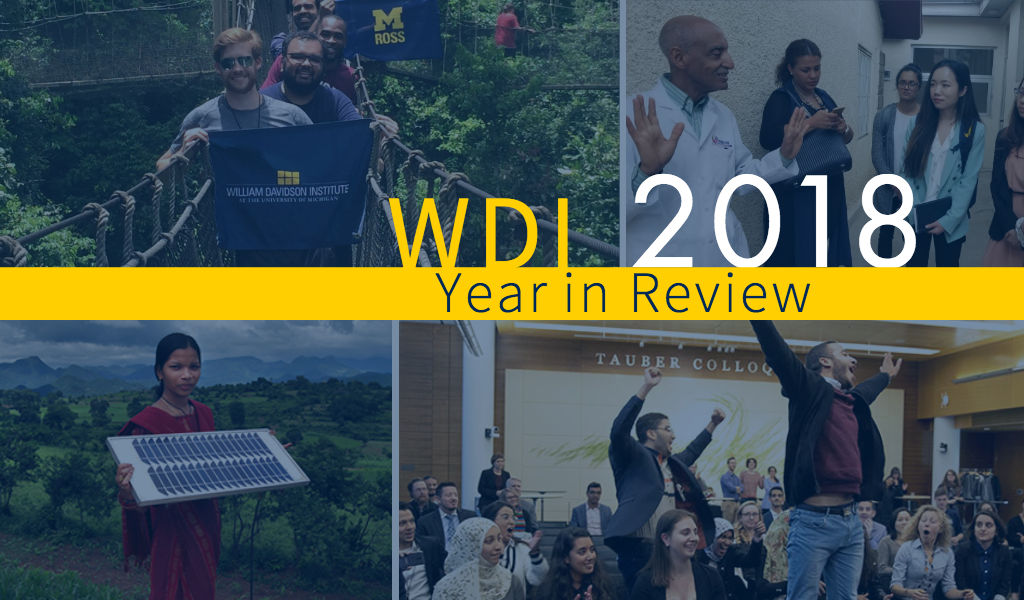
Improving reproductive health supply chains to boost access to family planning products in Mozambique. Educating senior managers from around the Baltics. Helping both investors and enterprises they support better measure impact in Latin America. Creating new MBA-level curriculum for universities in Papua New Guinea.
These partner projects are just a few examples of the work WDI performed around the world in 2018. Working with a robust set of private sector and nonprofit partners on a diverse number of projects, WDI effectively applied business skills in low- and middle-income countries (LMICs) in impactful ways.
In all, WDI teams worked on more than 40 projects with more than 40 partners in more than 40 countries this past year that focused on our core consulting sectors—education, energy, finance and healthcare, as well as our management education programs, entrepreneurship development, measurement and evaluation services and the deployment of University of Michigan graduate students around the world.
“In 2018, I was impressed by the degree to which the Institute integrated the energy and talents of our staff, University of Michigan students and faculty leaders to address multiple challenges facing for-profit and non-profit organizations,” said WDI President Paul Clyde. “While most of these projects were in one of our key focus areas—Energy, Healthcare, Management education or Finance—many drew on expertise that cut across sectors or disciplines to deliver more complete solutions.”
WDI’s project work leveraged the knowledge and expertise of the Institute’s staff, its research fellows and faculty from the University of Michigan and other world-class higher education institutions to develop business solutions in LMICs. Additionally, WDI disseminated what it learned doing work in the field through published research reports, academic journal articles and notable blog posts. The Institute also contributed to U-M student and faculty enrichment by hosting several compelling speakers at the Ann Arbor campus.

Members of the LIFE project consortium visit a produce stand in Turkey and interviews the owner on how a green grocer sources his produce and his perspective on how he could potentially benefit from the LIFE Food Enterprise Center.
Our work in 2018 spanned the globe and included projects on a wide variety of topics and issues. Among the work, WDI launched a new consulting focus area in the energy sector, connected hundreds of students using virtual technology, developed a model to train nurses for a planned hospital in Ethiopia and trained refugees in the food industry in Turkey. Here are a few highlights from our project work this past year.
Throughout the past year, WDI has widely shared its research and field work a to a broader audience through a number of publications and online journals.
“Participating in the project to test the framework provided us a holistic understanding of poverty. WDI gave us the tools to guide decision-making and track progress towards broader development goals through data collection and analysis.”
—Mónica Varela, director of impact for the Clinton Giustra Enterprise Partnership
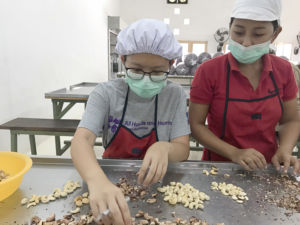
WDI intern Nadia Putri (pictured left)
A number of WDI employees penned blogs on their work or trends impacting their research that appeared on the Institute’s website.
In 2018, WDI hosted speakers as part of the the Institute’s Global Impact Speaker Series. While on campus, many of the speakers sat down for one-on-one interviews.
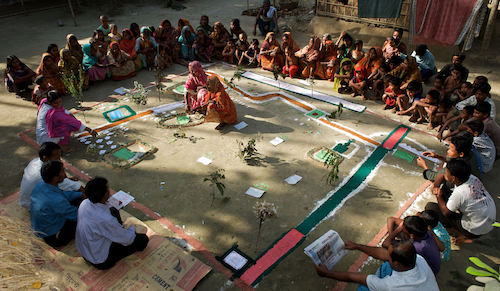
A series of articles on the many successes and occasional setbacks in the inclusive finance space has been compiled into an e-book published by NextBillion Financial Health, a blog and news resource that is part of NextBillion, the WDI-affiliated platform focused on entrepreneurship and venture development in emerging markets.
The e-book, “Insights and Innovations in Financial Health,” features 20 articles that highlight the impact and insights of MetLife Foundation, which sponsored the NextBillion Financial Health blog for the past year, and its many partner organizations. It is filled with in-depth research, business experiences and other practical insights from those working to advance financial health. (A PDF of the e-book can be downloaded here.) Gretchen Wheeler, WDI’s graphic and web design specialist, designed the e-book.
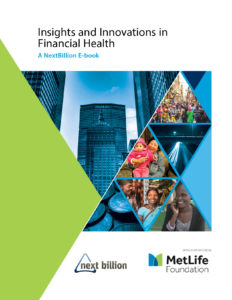 Launched in 2013 as NextBillion Financial Innovation, the site originally covered the “financial inclusion movement’s efforts to spread access to financial services to underserved clients. But the sector’s focus evolved over the years, with many advocating that inclusion by itself wasn’t enough.
Launched in 2013 as NextBillion Financial Innovation, the site originally covered the “financial inclusion movement’s efforts to spread access to financial services to underserved clients. But the sector’s focus evolved over the years, with many advocating that inclusion by itself wasn’t enough.
The NextBillion Financial Health site has reflected this evolving thinking, with articles that explore how the financial services industry can help low-income clients to balance income and expenses, accrue savings, handle debts and weather financial storms. Though the MetLife Foundation partnership has ended, the site continues to provide a platform for sharing research, innovations and analysis focused on how financial tools can improve the lives of low-income clients.
“We’re grateful to MetLife Foundation for their generous support of the site, and for the frank and insightful articles they contributed to it,” said James Militzer, editor of NextBillion. “The thought leadership the Foundation and its partners have provided has further solidified the inclusive finance sector’s movement toward a deeper understanding of the power – and limitations – of financial tools in addressing the challenges of poverty.”
NextBillion Financial Health remains one of the more popular areas of the NextBillion site overall: Finance-themed articles consistently rank among its most read and shared content.
WDI recently launched its Financial Sector Development (FSD) initiative, which identifies and implements ways for financial institutions to profitably lower the cost of capital available to SMEs in emerging economies. FSD’s current research focuses on using remittances to lower the cost of capital for small- and medium-sized enterprises.
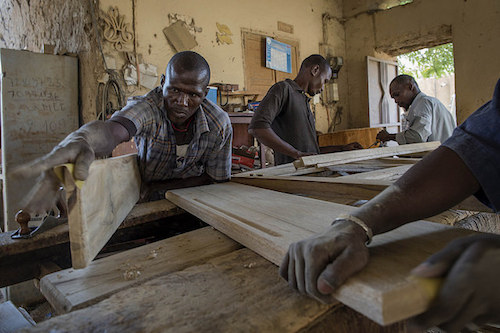
Top image: Employees from different ethnic groups are seen at work at a carpentry in Gao, Mali. Flickr credit.
Note: The following interview was conducted by Ekta Jhaveri, senior research associate for the Healthcare and Financial Sector Development Initiatives at the William Davidson Institute at the University of Michigan. The article originally appeared on NextBillion, which is managed by WDI.
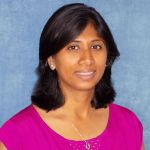
By Ekta Jhaveri
Many small and medium-sized enterprises (SMEs) in developing countries face a classic conundrum when it comes to securing finance. Most constitute the “missing middle,” as they are considered too big for microfinance institutions (MFIs) and too small or risky for traditional finance providers such as commercial banks.
This dilemma is well known, but to truly solve it, we need to know more. To get a deeper understanding of the missing middle SME sector, (which for the purposes of this article we refer to as MM-SME), and how to support it, the Dutch Good Growth Fund (DGGF) commissioned several studies on the entrepreneurial ecosystems of six francophone West African countries – Benin, Ivory Coast, Guinea, Mali, Senegal and Togo. The reports were published as part of DGGF’s #ClosingTheGap series, with research for the country studies conducted by Enclude.
I recently interviewed Julia Kho, knowledge manager at TripleJump, an investment management and advisory services firm that, along with PricewaterhouseCoopers, manages DGGF’s Investment Funds Local SMEs effort.
Ekta Jhaveri: Why was the francophone West African region chosen by DGGF for #ClosingTheGap studies?
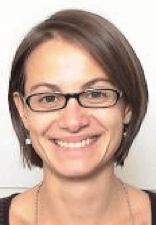
Julia Kho
Julia Kho: The DGGF supports financial intermediaries across the developing world, the mandate covers 68 countries in total. Local financial stakeholders reach out to DGGF for funding support. We received very few proposals from this region. That is why DGGF commissioned these studies to get a better understanding of the SME landscape and the ecosystem around them. The intent was to identify, elaborate on and strengthen existing and potential solutions – including fostering the appetite of investors in investing in local SMEs in the region – to address key challenges and obstacles faced by the missing middle entrepreneurs. Now we see more fund managers addressing this market and expect more activity in the coming years.
EJ: Can you briefly describe the process of entrepreneurial ecosystem assessments?
JK: The entrepreneurial ecosystem assessments were conducted using the ecosystem toolkit created by the Aspen Network of Development Entrepreneurs (ANDE). It involves analyzing the ecosystem along six dimensions or domains – culture, policy, markets, finance, support and human capital. A literature review was followed by field visits to conduct interviews with the stakeholders from the various domains. The fieldwork was followed by a workshop of key stakeholders to discuss findings and possible solutions to close the identified gaps along the six domains.
EJ: How do you characterize or define the missing middle SMEs in francophone West Africa? Were these SMEs homogenous across the six countries?
JK: The starting point of our definition of the MM-SMEs was the one mentioned above. We found that it was important to sub-segment the MM-SME sector in order to get a deeper understanding of the characteristics of local enterprises and their needs and regroup them under clusters that share these common characteristics and needs. The sub-categories we came up with are fairly general and they can be applied across countries; where they differ is around the relative representation of the sub-category by country. So, even though the markets in each of the six francophone West African countries differ, at a high level this sub-segmentation of the SME sector applies. The sub-segments we defined and found were a very large cluster of small necessity entrepreneurs (established for the sake of providing livelihood) followed by moderate growth entrepreneurs (mainly family-owned businesses), and smaller clusters of high-growth startups (young entrepreneurs mainly in the technology sector), opportunity-driven SMEs (entrepreneurs copying successful business models and involved in several businesses) and gazelles (successful startups with high growth rates).
While this sub-segmentation of the SME sector is an important exercise, we are now embarking on a deeper study with the Omidyar Network and DGGF. Its goal is to create a robust segmentation framework of SMEs, which will help investors and intermediaries match appropriate financial products with different enterprise segments, as well as help entrepreneurs understand the most appropriate investors to target.
EJ: Were the challenges more systemic or operational? Can you elaborate on the top three challenges across the six countries?
JK: Both – systemic and operational. While there is some variation across these countries, the few general challenges we saw were:
EJ: Were there any surprising findings from the entrepreneurial assessments you conducted with SME owners? Can you elaborate on a couple of these findings?
JK: I don’t know if these are specific to the region but we found a couple of things that were very interesting if not surprising. First, there is no shortage of dynamic entrepreneurs. The challenge lies in how they look at their business and in understanding their own needs. Entrepreneurs tend to talk about the need for external finance to grow their business. But often when discussing their business further, it appears that the first need is to secure recurring customers to sustain regular revenues and then think about finance, i.e. what type of financial support they need for which purposes. In the region, given the current financial service offerings, we identified that stakeholders are aware of debt products but their exposure to other financial instruments and products is extremely limited and hence their understanding of those, too.
Another finding is related to the varied level of professionalism and sophistication of local businesses. Keeping records of levels of production and supply needs, for instance, and analyzing those to identify what is needed not just to operate tomorrow, next week or next month but rather the next year, is not necessarily a common practice.
EJ: What are the different types of stakeholders (financial and non-financial) that provide support to SMEs? What is the level of collaboration among them?
JK: In addition to what was said earlier on the current financial offers, we identified a gap in financing at the very early stages of development of local enterprises. There are barely any players that can offer external funding (that is not collateralized debt) in the range of 10,000-1 million euros.
On the non-financial side of things, again, in addition to what was said earlier, we see a positive trend of one-stop shops being set up to provide information for local businesses such as how to register, etc. However, besides the few traditional business support development service providers that can be expensive, full-fledged service providers that help entrepreneurs – from the conceptual to commercialization stage – at affordable prices are extremely limited.
As a direct response to this identified gap, DGGF is supporting Suguba, a network of impact hubs that originated in Mali and which are looking to expand to Senegal and Ivory Coast. We are also supporting EtriLabs, a tech innovation hub in Benin and Innov’Up, a women-focused incubator in Togo.
As in many ecosystems, we observe that local stakeholders tend to be disconnected. If the SME sector is not sub-segmented based on characteristics and needs of local enterprises, then the service offering is not targeted and specialized, which makes collaboration challenging. Our work with Omidyar Network (mentioned above) is important as it will provide an understanding of the appropriate financial products based on different enterprise segments.
EJ: A pilot study for the #ClosingTheGap series was done for Kenya in 2015. Are there any learnings from the Kenyan entrepreneurial ecosystem assessment that can be applied to these six countries?
JK: There is no one-size-fits-all approach. There are many variations across the countries and Kenya has an ecosystem that tends to be more dynamic than the six countries we’re discussing. What we learnt was that the sub-segmentation methodology piloted in Kenya was applicable to any other market and that the sub-segments defined through the Kenyan study were also relevant to the francophone West African markets, although the relative proportions of SME sub-segments representation are different. The entrepreneurial culture is promoted in Kenya. There is diversity in terms of ecosystem players: MFIs, banks, mezzanine/venture capital/private equity funds, hubs, incubators and accelerators – and they intervene at different stages of maturity of the enterprises. We saw some linkages with universities (e.g. a hub or incubator hosted by a university). In fact entrepreneurship education is part of some high school/university curricula, which we don’t see in francophone West Africa.
EJ: What other types of innovative financial instruments have the potential to increase access to finance for such SMEs – and which types of financial institutions are best positioned to fill this need?
JK: There are steady moderate growth companies, often family-owned, whose service or product offerings address a market demand but they may still lack the track record, collateral, cash flow or profit levels that can qualify them for a bank loan. These companies require more risky (less collateralized), flexible and long-term capital to grow. This is what we refer to as “mezzanine finance,” which blends elements from traditional private equity and debt financing into a unique product. DGGF commissioned a study in 2016 that dives into this interesting additional offering for missing middle entrepreneurs and seems relevant to local enterprises in the region.
EJ: There is a lot of talk in the development community about the use of blended finance for the missing middle SMEs. What are your thoughts on this?
JK: The concept of blended finance is an interesting one. We see it as particularly relevant to foster innovations, i.e. to test and launch new and different financial products and models. In my mind, local intermediaries – both financial and non-financial ones – would benefit from this type of financial support to try out and identify what works/does not.
All the reports under the #ClosingTheGap series can be accessed on the DGGF website.
Ekta Jhaveri is senior research associate for the Healthcare and Financial Sector Development Initiatives at the William Davidson Institute.
This case study shares five valuable lessons for impact investors and enterprises to strengthen their impact measurement practices. The case is based on experiences testing an impact measurement framework with social enterprises in Nicaragua, Brazil and Peru. The case provides recommendations to improve the impact measurement practices of investors, as well as the enterprises they support. For investors, creating a standardized set of indicators to be shared across enterprises is beneficial for aggregating data, using resources efficiently, and facilitating shared learnings across their network of investees. For investees, impact measurement can expose vulnerabilities along the value chain that affect an enterprise, such as turnover and client loyalty.
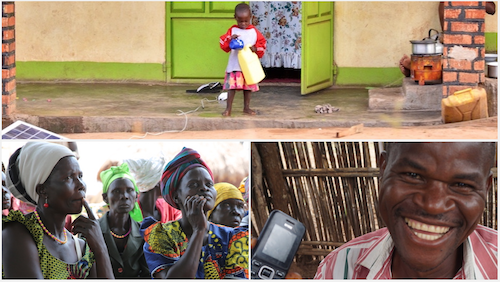
Images illustrating the most influential articles on NextBillion in 2017.
In recent years, the off-grid energy business has been one of the hottest industries in low-income economies, particularly in East Africa. But a post written by an impact investing fund explaining why it was backing off investments in the sector after being active in the space was voted by NextBillion readers as the most influential article of 2017. NextBillion is an affiliate site of WDI.
Written by three principals from venture capital firm Ceniarth, the authors aired concerns about the solar home system industry’s “hype cycle” that touched off a year-long debate on NextBillion. The post garnered slightly more than 25 percent of the readers’ votes, edging out a post on a potential new, outcome-based solution to funding and scaling poverty alleviation approaches. The third place post made the case that pushing technology for financial inclusion projects for smallholder farmers often is more harmful than helpful.
For the past six years, NextBillion editors have asked readers in December to vote on which of the 12 most-read articles by month were the most influential of the year. The votes were tallied and the winners were announced on NextBillion on Jan. 3.
NextBillion, which is managed by WDI, is one of the largest online platforms for views, jobs, events and news around business and investment solutions to poverty. Summaries of each post, written by NextBillion editors, as well as links to the winning posts can be found below.
An Impact Investor Urges Caution on the ‘Energy Access Hype Cycle’
Ceniarth, an impact investment group, had been fairly active in the energy access sector for at least three years. But in 2017, the three principals with the firm – Greg Neichin, Diane Isenberg and Mary Roach (now at Loowatt), explained why they were stepping back from off-grid energy venture capital investments in emerging markets. Their concerns about the solar home system sector touched off the longest-running debate this year on NextBillion, as several sector investors echoed their concerns, while others, including some entrepreneurs, rebutted them.
Key quote: “… it is not easy for most investors to publicly acknowledge concerns about sectors where they have made financial commitments. It poses a risk to the capital that they have already extended in the market. As we maintain current financial exposure to the solar home system sector, it would be economically rational for us to keep our heads down quietly.
As a mission-oriented firm, however, we felt it was important to transparently share our insights even if they are in conflict with our financial interests. We will continue to try to live up to this promise as we work collaboratively to fund solutions that deliver critical and sustainable improvements in rural livelihoods.”
The graduation approach is a promising solution to poverty, with proven results. But it’s difficult to scale, and traditional funding models lack the flexibility and performance incentives to drive its impact, since funding is typically tied to activities rather than outcomes. Dianne Calvi, president and CEO of the NGO Village Enterprise, discusses an intriguing new solution: the US $5.26 million Village Enterprise Development Impact Bond (DIB), which she calls “the first-ever outcome-based development impact bond” focused on poverty alleviation in Africa. Can it provide a model for future funding of anti-poverty programs?
Key quote: “Critics of impact bonds have noted that their set-up costs are high and their scale is limited. We believe this has mainly been because previous approaches have insufficiently leveraged true market forces, and instead have relied on a central and over-engineered approach. We believe that if donors come together to commit significant outcome funds and specify clear and realistic conditions for a provider to earn payments, capable service providers will have the incentive to build capabilities to mobilize the necessary working capital and negotiate terms with investors.”
If each and every one of the approximately 500 million farmers who feed about 2 billion people received a mobile phone tomorrow, it might not improve their lives. For many who have to navigate spotty networks, unreliable apps and various levels of financial literacy, a mobile phone can be more burden than blessing. Alexandra Fiorillo, the founder and principal at GRID Impact, explained why financial inclusion projects need to avoid pushing technology for its own sake.
Key quote: “Although the benefits of mobile money are frequently touted, it isn’t always the best solution. In fact, research shows that many people save more and spend less when handling physical cash. … Instead of pushing technology for technology’s sake, financial inclusion projects ought to seek diverse solutions that are appropriate and accessible for customers based on their needs – which may mean providing a choice of cash modality (e.g. hard cash, mobile money and card-based solutions).”